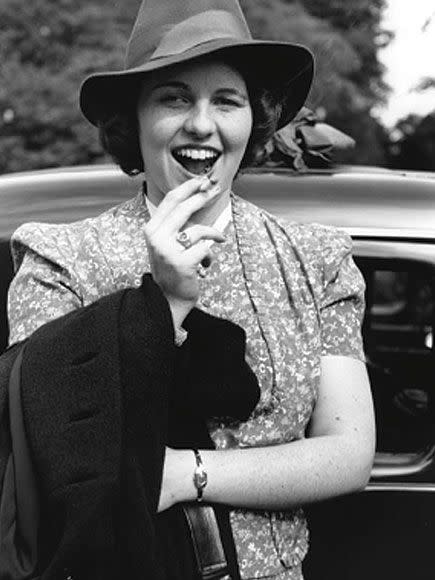Inside Rosemary Kennedy's Disastrous Lobotomy – And How Her Father Chose Her Doctor
- Oops!Something went wrong.Please try again later.
- Oops!Something went wrong.Please try again later.
- Oops!Something went wrong.Please try again later.
Dotdash Meredith and Yahoo Inc. may earn commission or revenue on some items through the links below.

Courtesy Shriver Family Collection
When she was just 23, Rosemary Kennedy underwent a relatively new procedure – a prefrontal lobotomy – that was ordered by her father in an attempt to ease her emotional outbursts.
Instead, the surgery left her mentally and physically incapacitated for the rest of her life.
While Rosemary's father, Joseph P. Kennedy, made the decision to have her lobotomized, Elizabeth Koehler-Pentacoff, author of the new book The Missing Kennedy, tells PEOPLE he did what he thought was best, however misguided.
"He was searching for the best for his family," says Koehler-Pentacoff, whose aunt, Sister Paulus, was one of Rosemary's caretakers for more than thirty years.
Joe and wife Rose refused the popular alternative of the time – putting their daughter away in a mental institution, never to be seen again. Instead, they enrolled her in a series of schools and asked her siblings to look out for her. "They fought it up until she was a young woman," says Koehler-Pentacoff, "and suddenly things changed."
As Rosemary entered her late teens, her parents saw less of the affectionate, dutiful and eager to please young woman they knew and loved, and more of her violent outbursts. She began "screaming and yelling and throwing things. She was violent and throwing vases across the room. She was out of control," Koehler-Pentacoff says.
Meanwhile, despite the American Medical Association's warnings, lobotomies were being touted, by a vocal few, as hope for people suffering from serious mental illness – and Joe latched onto that hope.
Without his wife's knowledge, he took Rosemary to see Dr. Walter Freeman, a controversial neurologist, psychiatrist and professor at George Washington University who had gained fame for popularizing lobotomies in America.
"He took her to the best at the time, and at the time, TIME, Reader's Digest, Newsweek, everybody was touting the best thing for mental illness – the lobotomy," Koehler-Pentacoff says. "It was the cure-all. People were so eager for some help that they just grabbed onto it."
The doctor diagnosed Rosemary with "agitated depression" and promised Joe a lobotomy would put an end to her rages and render her happy and content.
In the fall of 1941, Dr. Freeman, assisted by Dr. James Watts, performed a prefrontal lobotomy on Rosemary at George Washington University Hospital.
She was never the same.
What Went Wrong?
Freeman and other champions of the lobotomy touted the extreme procedure as quick and easy. But Dr. Steven Holtz, a neurologist on the faculty of the University of California, Berkeley, tells Koehler-Pentacoff that recovery could be slow and complicated.
"When you do any kind of operation, there is swelling around the tissue that has been damaged, and the swelling impedes the function of the nerve cells and wires that come from those nearby nerve cells," he explains in The Missing Kennedy. "When the swelling recedes, those cells and structures can start working again."
After the botched surgery, Rosemary was left with the mental capacity of a toddler – unable to walk, form a sentence or follow simple directions. She was forced to relearn the most basic of skills, but some would never be recovered.
"The frontal lobe is the pilot of your brain," says Holtz. "It controls your executive function, which directs everything. The theory behind it is essentially preventing the direction of impulses that were adherent. When one emerges from a lobotomy, one becomes docile, placid, apathetic, and devoid of affect."
In what would become a decades-long secret for the Kennedy family, Joe hid Rosemary away at Saint Coletta, a Catholic facility for the mentally disabled in Jefferson, Wisconsin, where she was cared for by Koehler-Pentacoff's aunt.
It wasn't until 20 years later, when Joe had a stroke in 1961, that Rosemary's mother and eight siblings learned the entire truth about what had happened to her.
Despite widespread criticism of his work following Rosemary's surgery, Freeman went on to perform thousands more lobotomies, and to create and popularize the transorbital lobotomy, in which he used an ice pick to enter the patient's brain through the eye sockets. He was finally banned from operating in 1967 after one of his longterm patients died from a brain hemorrhage following her third lobotomy by Freeman.
The lobotomy was later labeled "the surgery of the soul," Koehler-Pentacoff tells PEOPLE. "If a patient was agitated and violent before the operation, afterward it seemed as though his or her personality had been erased," she writes chillingly in her book.
But the lobotomy Joe Kennedy ordered wreaked havoc on his daughter.
Joe's grandson Anthony Shriver offered Koehler-Pentacoff an optimistic take on Joe's motives: "The experts in the field recommended [this procedure] to give her a more peaceful and productive life. He had a relentless desire for all of his children to be the best and to give them the best. He had a track record of being determined to give his children the best of everything."
"The goal was to enhance her life."
